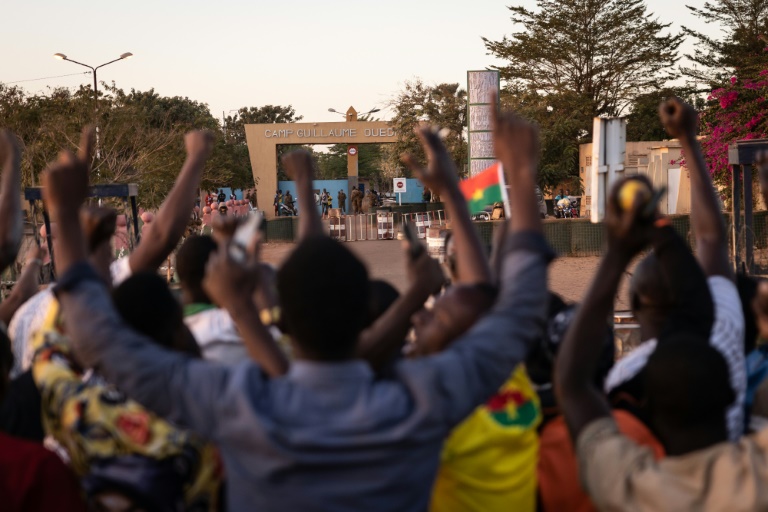
OUAGADOUGOU, Jan 26 (NNN-AGENCIES) — Supporters of Burkina Faso’s new ruling junta rallied on Tuesday as France and the UN condemned the West African country’s latest coup.
Officers detained President Roch Marc Christian Kabore in the volatile state on Monday amid deepening anger at his handling of a jihadist insurgency.
The poor Sahel country now lies in the hands of the Patriotic Movement for Preservation and Restoration (MPSR), the name of a junta led by Lieutenant-Colonel Paul-Henri Sandaogo Damiba.
Several hundred people took to the streets in the heart of the capital Ouagadougou Tuesday for a rally aimed at showcasing support for the junta.
“We called for President Kabore’s departure several times, but he didn’t listen to us. The army heard us and understood,” said Lassane Ouedrago, an activist in a grassroots group.
“As far as we’re concerned, it’s not a coup,” said Julienne Traore, a 30-year-old teacher. “It’s the liberation of a country, which was being governed by people who were incompetent.”
Some demonstrators carried Malian and Russian flags — a reference to Mali’s military junta, which in 2020 also took power on the back of protests over the response to jihadist bloodshed and has recently woven security ties with Moscow.
On Monday night, a statement signed by Damiba announced the suspension of the constitution, the dissolution of the government and parliament and the closure of the country’s borders from midnight.
On Tuesday, the junta announced the resumption of air traffic while reopening land borders for vehicles carrying humanitarian, military and essential goods.
The MPSR will re-establish “constitutional order” within a “reasonable time,” the statement said, adding that a nationwide 9 pm to 5 am curfew would be enforced.
Despite the latest turmoil, life in Ouagadougou seemed to continue as normal on Tuesday.
The city’s main market, shops and petrol stations were open, and there was no particular military presence in the centre.
West Africa has been rattled by three military coups in less than 18 months, beginning with Mali in August 2020 and Guinea in September 2021.
It is the latest bout of political turmoil to strike Burkina Faso, which has had little stability since gaining independence from France in 1960.
French President Emmanuel Macron condemned a “military coup” on Tuesday, while the UN’s human rights office said it “deeply deplores the military takeover of power”.
“We call on the military to immediately release President Roch Marc Christian Kabore and other high-level officials who have been detained,” the office’s spokeswoman, Ravina Shamdasani, told reporters in Geneva.
“We urge a swift return to constitutional order.”
France has committed thousands of troops to shoring up its former colonies Burkina Faso, Niger and Mali — three of the world’s most impoverished countries — in the face of a brutal jihadist offensive.
The G5 Sahel, an anti-jihadist alliance that includes Chad, Mali, Mauritania and Niger as well as Burkina Faso, issued a statement saying it was “very concerned” by events and “strongly condemns this attempt to disrupt the constitutional order.”
On Monday, West African states in the ECOWAS bloc described the volatility as a “coup attempt” and held “soldiers responsible for (Kabore’s) physical well-being”.
The national TV channel RTB late Monday published on social media a handwritten letter that it said was written by Kabore, purportedly saying that he was stepping down “in the higher interests of the nation”.
The letter could not be independently verified.
The whereabouts of Prime Minister Lassina Zerbo and other senior officials are also unknown.
The junta said “the operations (to overthrow Kabore) unfolded without bloodshed and without any physical violence towards the persons arrested, who are being held in a secure place with respect for their dignity”.
Kabore’s downfall came amid deepening anger at the government’s failure to stem Burkina Faso’s security crisis.
Armed Islamists began launching cross-border raids from Mali in 2015, overwhelming the country’s poorly trained and badly equipped armed forces.
Around 2,000 people have died. In a country of 21 million, some 1.5 million people are internally displaced, according to the national emergency agency CONASUR.
Bloody attacks on the army, police and a volunteer civilian militia mounted throughout 2021, and accounts of negligence or indifference by top commanders sparked particular anger.
On Saturday, police used tear gas to disperse banned protests, arresting dozens of people.
The following day, troops began to mutiny in numerous barracks, and Kabore was toppled on Monday. Kabore was elected in 2015, pitching himself as a beacon of hope after the long reign of strongman Blaise Compaore, who came to power in a putsch in 1987. — NNN-AGENCIES





